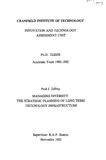JavaScript is disabled for your browser. Some features of this site may not work without it.
| dc.contributor.advisor | Seaton, R. A. F. | |
| dc.contributor.author | Jeffrey, Paul | |
| dc.date.accessioned | 2010-01-21T14:55:45Z | |
| dc.date.available | 2010-01-21T14:55:45Z | |
| dc.date.issued | 1992-11 | |
| dc.identifier.uri | http://hdl.handle.net/1826/4167 | |
| dc.description.abstract | Current methods of addressing uncertainty in the field of technology planning and management rely heavily on the use of forecasting and scenario generation. However, current developments in the planning and systems literature suggest that concepts of diversity and resilience provide an alternative framework for addressing uncertainty. Consequently, this thesis adopts an interdisciplinary approach to investigate three specific aspects of the technology assessment process; the limits to information from quantitative modelling, technological and managerial strategies for combating uncertainty, and the roles of models and modellers in these strategies. As a preface to the study, the nature of resilience in the context of technology planning is reviewed and some propositions are made concerning the matching of planning tools with levels of management sovereignty. A series of simulation models developed as part of the research programme provide some useful insights into the role of diversity in promoting both reduced costs and greater cost stability over the long term. However, they also expose a number of methodological limitations to modelling diversity in technological systems. These limitations are associated with both the representation of diversity and the exposure of multiple solutions. The second strand of investigation shows that the flexibility promoted by managers active in a turbulent operating environment, is focused on organisational and human centred attributes of the firm's activities. The final research activity shows that professional modellers in the U. K. appear to be aware of the limitations of the tools and techniques they utilise and perceive their role as being one of providing a rational / scientific approach to problem solving. Both policy and methodology related conclusions are drawn from the three research activities. Integration of the various strands of the research results emphasises the importance of matching the strategic and decision issue contexts of a policy issue to the analysis and policy tools used. Several recommendations for further research are also provided. | en_UK |
| dc.language.iso | en | en_UK |
| dc.publisher | Cranfield University | en_UK |
| dc.title | Managing diversity : the strategic planning of long term technology infrastructure | en_UK |
| dc.type | Thesis or dissertation | en_UK |
| dc.type.qualificationlevel | Doctoral | en_UK |
| dc.type.qualificationname | PhD | en_UK |
